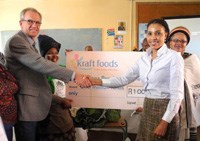
Subscribe & Follow
Advertise your job vacancies
Jobs
Humana People to People gets R1 million from Kraft Foods
Humana People to People in South Africa has received a further R1 million from Kraft Foods, part of its three-year phased donation to the NGO. Last year, it received R1.8 million from the international food giant.

Pat Senne, Kraft Foods Director Corporate and Government Affairs for Southern and Central East Africa (right), hands over cheque to Niels Matthiessen, Humana’s Country Director
This donation is part of the South African company's flagship 'Sustainable Agriculture Project' and is in keeping with the group's global corporate-social-responsibility programme, which provides support in Africa in three key areas; hunger and poverty alleviation, healthier lifestyles and sustainable agriculture.
Pat Senne, Kraft Foods director corporate and government affairs for Southern and Central East Africa, said the outreach program to the Mbashe municipality in Amathole district, Eastern Cape, one of the poorest areas in the country, was making progress.
To date two Farmers Clubs in Qinqana North and Qinqana South - each with 200 farmers - have benefited from the project, which is led by Humana personnel living among the farmers. The farmers have benefited from training sessions, and technical and personal assistance in a skills-transfer program intended to empower subsistence farmers by offering access to organized club life.
"I'm delighted to report that food gardens - an important component of the project - are going a long way towards alleviating hunger in this community," Senne said, adding that farmers are managing to support an average of eight people per family. Maize is being produced in large volumes, while vegetables - including spinach, beans and green peppers - are being farmed on a smaller scale. Produce is sold to the local Mpakama School and the surrounding community.
Giving the cheque to Niels Matthiessen, Humana's country director, Senne said that the contribution would be used towards the ongoing development of the Mbashe community by enabling new projects, and continuing skill development and healthy-lifestyle education to mitigate the impact of HIV/Aids and TB in the area.
Matthiessen thanked Senne for the company's generosity and for making a difference to the people of Mbashe. "Today's donation complements the initial funding, part of which was allocated towards the construction of a rope-washer pump in the Hwahwa area in Qinqana South, and with the construction of a weir dam to control water flow in Ejelevini in Qinqana North. The additional funding will be allocated towards the installation of rope pumps, a borehole, and irrigation tanks, as well as training farmers in the maintenance of water pumps."









